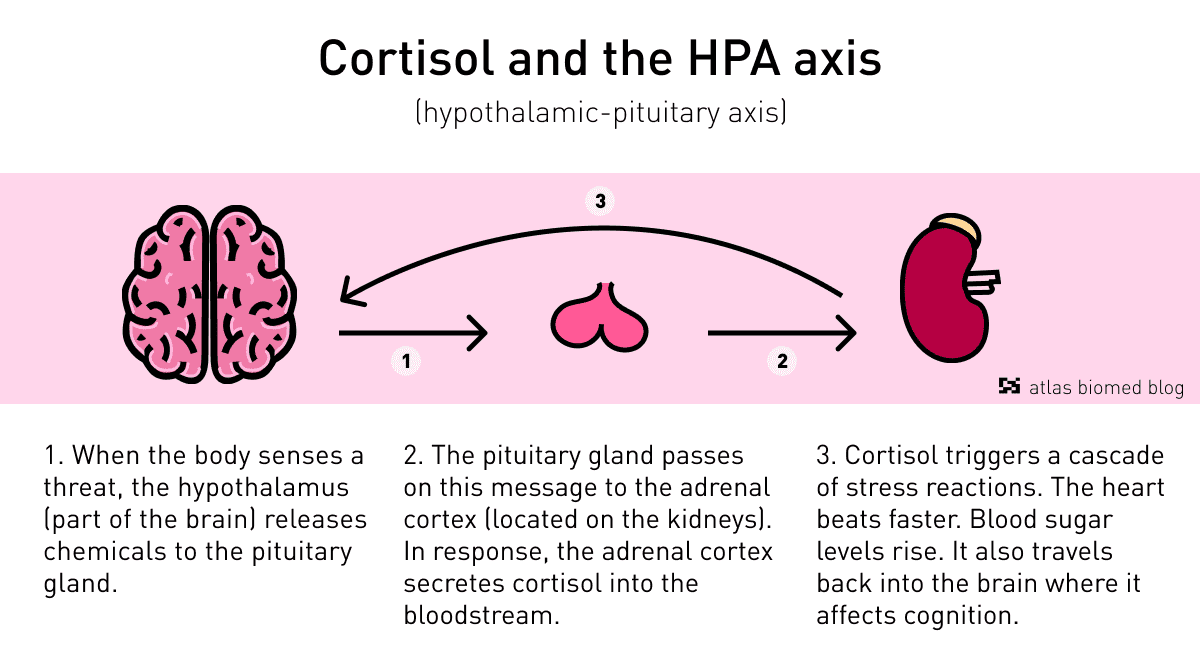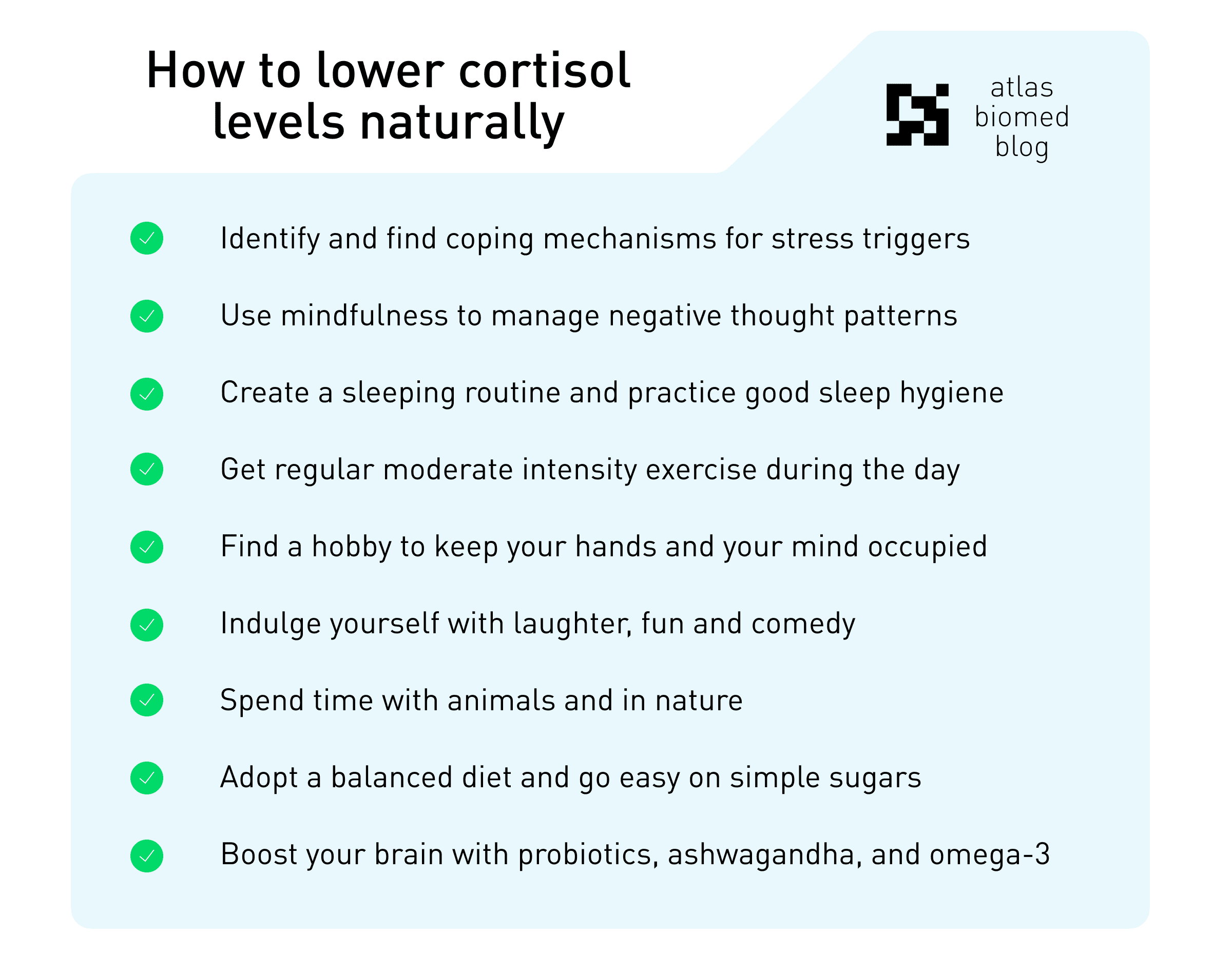Cortisol is a stress hormone released by your adrenal glands when your body feels threatened. Find out how to reduce cortisol levels naturally in this article.
Often known as the “stress hormone” because it’s released during stressful situations, cortisol helps your body deal with traumatic or adverse events. It tells your body to pump blood faster and to release glucose for energy. However, prolonged high levels of cortisol can do you more harm than good.
It’s not all bad though, because part of the cortisol function is to help you wake up. Cortisol levels are naturally higher when you wake up and they gradually decrease throughout the day until it’s time to fall asleep. It also helps to regulate your blood sugar levels and your blood pressure.
The problem occurs when your body is under chronic stress. Over time, increased levels contribute to weight gain, high blood pressure, diabetes, skin changes, and low mood.
So, it is important to find out how to lower cortisol naturally so that your body doesn’t think it is constantly in a fight-or-flight situation. This guide will tell you 11 hacks that reduce cortisol and combat stress.
☝️DISCLAIMER☝This article is for informational purposes only. It is not intended to constitute or be a substitute for professional medical advice, diagnosis, or treatment.
Table of contents
- 1. Reduce stress
- 2. Recognise stressful thinking
- 3. Sleep hygiene tips
- 4. Exercise
- 5.Find a hobby
- 6. Have a laugh
- 7. Get a pet
- 8. Foods that lower cortisol
- 9. Gut microbiome, cortisol and stress
- 10. Forest bathing
1. Figure out your stress triggers
Stress and cortisol are closely interlinked. A stressor is any stimuli that causes anxiety or stress. It can be something physical or psychological, like a threat to your safety or an unexpected change to your environment. It could also be pain, financial worries, relationship issues, or work-related problems.

When your body is exposed to stress, cortisol is released to keep the body on high alert and can even provide much needed energy, an important factor in the “fight or flight” response. Therefore, stressful situations increase cortisol production.
Understanding your own triggers is vital if you want lower cortisol levels. Keep a journal to record stressful situations. You don’t have to go into detail, but make a note of what happened and consider why it made you feel bad.
You can use this information to find practical ways of managing these situations. For example, stepping away from arguments, learning to say no to extra work, and avoiding unnecessary triggers (including social media) are good places to start.
2. Recognise stressful thinking
Thinking about worrying or traumatic times are a trigger for cortisol release. Research shows that people who write about stressful events often have increased cortisol levels. In fact, negative thinking has been shown to increase cortisol levels and lower oxytocin (a relaxing hormone and neurotransmitter that calms the nervous system).
Thinking about the past or negative emotional thoughts can increase stress hormone cortisol levels. Two thought processes in particular are linked with negative health consequences: rumination (deep thought about a particular topic) and worry.
Mindfulness is one way to combat negative thought processes and reduce cortisol levels. One study analysing the use of meditation in at-risk subjects, including those with depression or post-traumatic stress disorder (PTSD), showed that meditation programs are beneficial for those at risk of high cortisol levels, and longer interventions were the most successful.
3. Get a good night’s sleep
Sleep deprivation increases cortisol, particularly the evening after the lack of sleep has occurred. Cortisol is produced by the hypothalamic-pituitary-adrenal (HPA) axis, which is also responsible for regulating sleep cycles. If the HPA axis is activated by stress, illness, or poor nutrition, it can have a knock-on effect on your sleep and subsequent stress hormone levels.
The best way to ensure you get restful sleep is to incorporate good sleep hygiene. Make your bedroom a peaceful environment by limiting things that disrupt your sleep, like noise and light. Blackout curtains, an eye mask, earplugs, or a noise machine can help.
Sleep hygiene tips for lower cortisol levels
- Go to bed at a regular time each night.
- Set an alarm to get you up at the same time each morning.
- Wash your bedding and night clothes regularly.
- Keep distractions, like noise, tv, and phones, to a minimum before bed.
- Avoid caffeine in the afternoon and evening.
- Don’t exercise in the evening.
- Avoid bright lights and screens before bed.
☝FACT☝Shift work from early adulthood is associated with increased, prolonged cortisol levels and a higher body mass index (BMI).
4. Exercise
Interestingly, moderate-intensity exercise doesn’t lead to increased levels of the stress hormone in the short term. Just like intense exercise, moderate exercise (40% and 60% of your maximal effort) also induces nighttime cortisol level reductions. It’s also great for promoting gut microbiome diversity!
Lower your cortisol levels and release stress with regular exercise, but avoid strenuous late afternoon and evening workouts, which are more likely to keep you awake. Physical activity doesn’t just benefit your body, many doctors recommend it for better mental health too.
5. Find a hobby
Learning to relax is really beneficial, especially if you want to lower your stress levels. Taking up a new hobby is one way to relax and learn a new skill. Hobbies may also include mindfulness activities, such as yoga, which has been associated with a significant drop in cortisol.
For example, taking up gardening in veterans who may be experiencing depression, substance abuse, or post-traumatic stress disorder has been shown to regulate stress, resulting in cortisol reduction.
Hobbies are an ideal way to improve your sense of wellbeing. Art is another activity which has been linked to significantly lower cortisol levels. It doesn’t matter what your hobby is as long as you enjoy it. Hobbies are a rewarding and wholesome way to achieve a better quality of life.
6. Have a laugh
It’s true, having a good belly laugh is good for the soul, but also for the mind. Don’t forget, cortisol is a type of stress hormone released by the body to help it deal with challenging and negative situations. Laughter, on the other hand, is a positive behaviour and is both useful and a healthy way to naturally overcome stress.
A study published in 2008 found that anticipating laughter at a humorous event, such as watching a funny film, resulted in lower cortisol levels in the blood, as well as two other stress hormones (epinephrine and dopac).
When you’re having a good time, it’s difficult to feel stressed. That’s why it is important to engage in positive events and keep yourself happy. On top of keeping stress and cortisol levels low, laughter actually lowers blood pressure too.
7. Get a pet
Having a pet is scientifically proven to lower cortisol levels. One study measured the presence of a dog compared to a friend in a stressful situation, and found that those in the dog group had lower cortisol levels compared to the friend group and a control group (with no social support).

Interactions between humans and dogs increase oxytocin levels in both owners and their furry friends, and decrease cortisol levels in humans, relieving stress. Another study showed that when comparing dog owners with non-dog owners, introducing non-dog owners to a canine companion caused a greater drop in stress hormones.
Pets bring other health benefits too. They provide a focus, reduce blood pressure, and can help combat loneliness. And it’s not just dogs that can have a positive impact on health and wellbeing, cats do too, as do caged birds like canaries and budgies.
☝FACT☝Physical interaction between dogs and their owners actually increases cortisol in dogs. It’s not thought to be stress-related, more anticipation to play.
8. Eat a healthy diet
Diet is an important factor in health, including lowering cortisol, but eating the wrong foods can trigger cortisol release, like sugar. Regularly consuming high levels of sugar can keep your cortisol levels elevated, which has also been associated with greater risk of heart disease in obese men.
Cortisol interacts with neurotransmitters (chemical messengers in the brain), which are vital for regulating mood. Both hormones and food contribute to the production of these chemical messengers. That’s because many foods contain the nutrients needed to build them.
Foods that lower cortisol
Foods that are naturally high in polyphenols lower the cortisol stress hormone. The long-term health benefits of drinking green tea, for example, are well established, and drinking just a half a cup per day keeps the risk of developing depression and dementia low.
Eating plenty of foods that reduce cortisol and restricting your sugar intake will keep your stress response under control.
| Food | Drinks |
|---|---|
| bananas | black tea |
| dark chocolate | green tea |
| prebiotic fibre | probiotic yogurt drinks |
| probiotic foods e.g. kimchi, sauerkraut | water |
☝TIP☝Dark chocolate is rich in polyphenols and reduces salivary cortisol levels.
9. Probiotics to lower cortisol
The human gut microbiome is home to trillions of bacterial cells which have major benefits for your health. They keep your gut barrier strong, combat inflammation, modulate the immune system, and even help regulate mental health. That’s why boosting the composition of your gut is important.

Probiotic bacteria may help reduce cortisol and stress. For example, bacteria such as Lactobacillus rhamnosus and L. farciminis lower the release of cortisol caused by stress. One strain of Lactobacillus, known as L. Plantarum 299v, was shown to reduce exam stress in irritable bowel syndrome patients.
Probiotic foods that nourish gut bacteria, such as yoghurt drinks and fermented soy products that contain specific lactic acid bacteria strains, may help to reduce stress-induced elevated cortisol levels. Some of these bacteria also relieve symptoms of IBS and the stress associated with living with a chronic illness.
☝TIP☝ Want to find out how diverse your gut microbiome is? Take the Atlas Microbiome Test.
10. Forest bathing
Spending time in nature should never be underestimated because it has proven health benefits. In particular, the practice of forest bathing is effective at reducing cortisol and could be a short-term stress reliever.
Forest bathing is actually a Japanese practice called shinrin yoku where you spend time amongst the trees, calmly and quietly and breathing deeply as you observe the nature around you.
The positive effects of forest bathing on cortisol levels were described in the International Journal of Biometeorology. It’s especially beneficial practice for city-dwellers because urban locations don’t have many green spaces and trees.
- Chandrasekhar, K et al. A Prospective, Randomized Double Blind, Placebo-Controlled Study of Safety and Efficacy of a High-Concentration Full-Spectrum Extract of Ashwagandha Root in Reducing Stress and Anxiety in Adults, 2012
- Dinse, H, R et al. The Stress Hormone Cortisol Blocks Perceptual Learning in Humans
- Gilbert, N. The Science of Tea’s Mood Altering Magic, 2019
- Linz, R et al. Interactions of Momentary Thought Content and Subjective Stress Predict Cortisol Fluctuations in a Daily Life Experience Sampling Study, 2018
- Petersson, M et al. Oxytocin and Cortisol Levels in Dog Owners and Their Dogs Are Associated with Behavioural Patterns: An Exploratory Study, 2017
- Tsang, C et al. Effect of Polyphenol-Rich Dark Chocolate on Salivary Cortisol and Mood in Adults



















